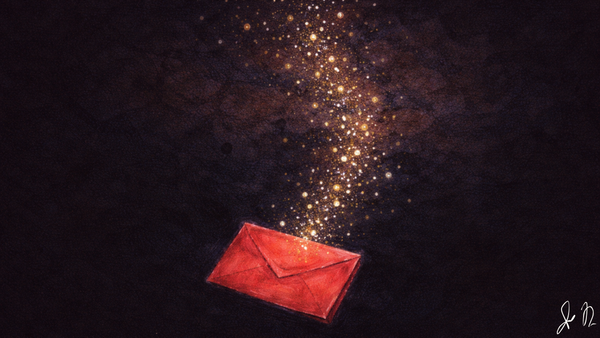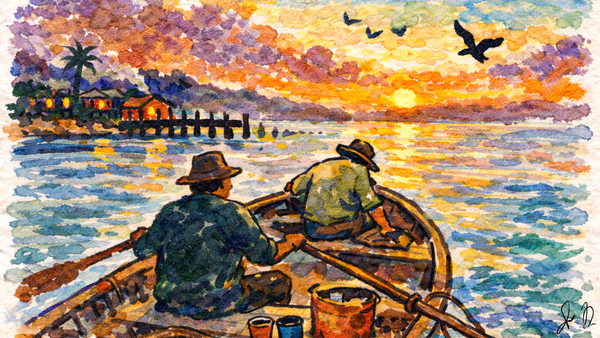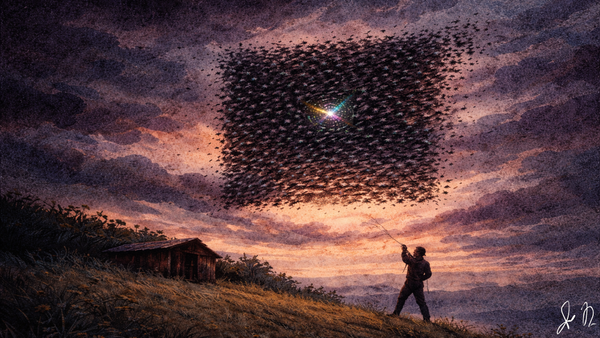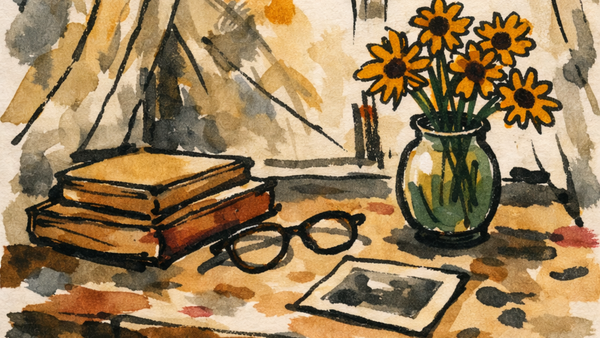The Graven Oaths
Magic oaths carved in bone. Trauma passed through blood. Both must be cut out.
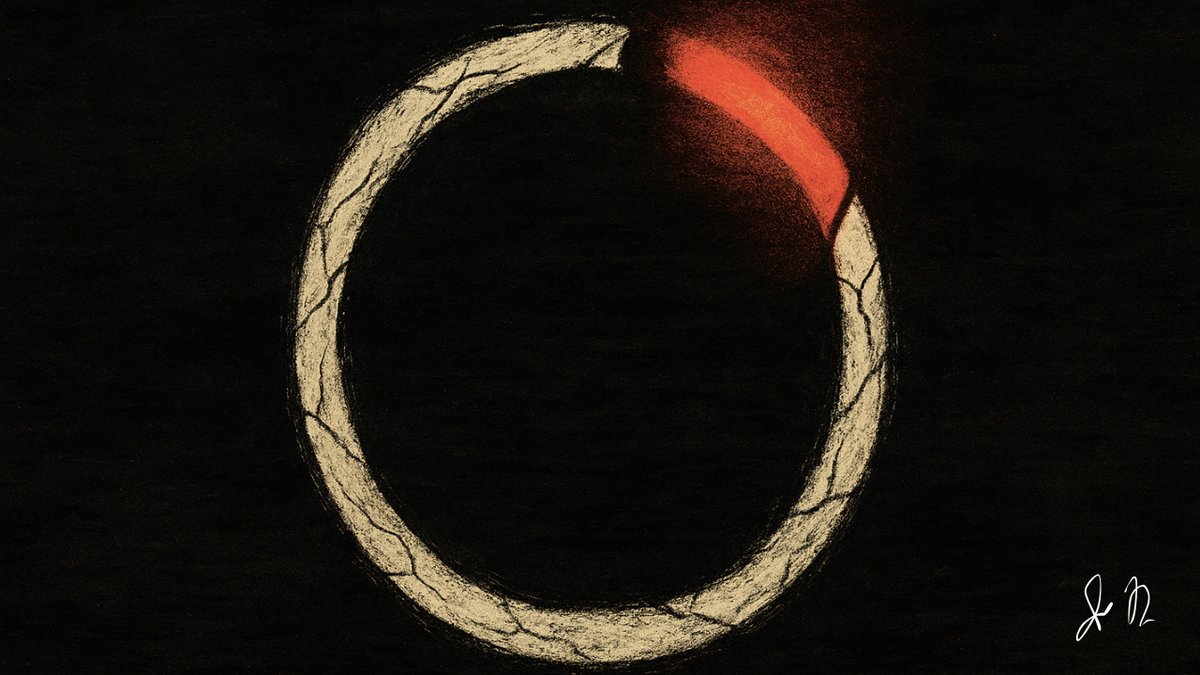
Content warning: This story contains descriptions of graphic violence, mass casualty events, military trauma, institutional gaslighting, and themes of complicity in war crimes. If these subjects are difficult for you right now, this might be one to skip.
I didn’t mean to speak when the gun came up. Though a person doesn’t choose what their fear decides to say. Fear speaks first. Fear speaks loud. Fear speaks long before a person understands what it has promised. The old records show it again and again: one voice trembling in a corner, one voice cracking in a crowd, one voice breaking in the dark, and the Oath answering all three. Fear carves faster than even the sharpest of edges.
Fear spreads.
If we were the kind of people who told the truth about the way fear and magic and violence—yes, and war—strip a life down to its last bare nerve, we would lay it all out clean on the table, and you can look into the files yourself, though you won’t find anything worth the effort. You’ll see birthday parties and endless famine and the ones in between who thought they were brave until they weren’t and every other kind of ruin we pretended had no author.
And it all accounted to nothing because the dead don’t care how many reports we write or how much footage we replay to soothe ourselves. Not that we tend to learn anything from the sins of our own making.
I didn’t mean to speak when the gun came up. The Oath did the rest. Carved in my bones, a simple law played itself out in the coldest of magics. If a gun is raised to you with murderous intent, you will defend yourself.
But I did more than defend myself. The fear and the carving responded proportionately. To me. To my inert definition of fear. In other words, the Oath interprets defense through the speaker’s deepest understanding of the word—and I was a soldier. I had been trained to think in terms of preemptive annihilation. Even in a gas station while on leave, just trying to find cheap cigarettes and a cheaper light.
Why would they bother telling us what really happened next? The reports were quite clear, after all, and the agency’s position was fully documented in the post-incident review. The casualties were regrettable, certainly, and the procedural breach was isolated to a single unit operating under exceptional conditions consistent with the operational guidelines as interpreted by regional command. The oversight committee found no evidence of misconduct, definitely not of the kind that would trouble anyone who has read the appendices, and the internal memorandum simply reaffirmed the official understanding that no one could have anticipated the outcomes even though the warnings were submitted on time.
And when you consider the chain of authorization, and the precise scope of delegated authority, and the established precedent for discretionary action during periods of Oath instability, what else could explain the result?
But here’s the thing. I was there. I saw it. I did it. It was not complicated. It was not hidden. It was not a misunderstanding.
It was one bad night. Just pressure. Just the usual line about doing what I had to do. I never said no, to be clear. It was an Oath, carved into my bones and absolute. Even saying no would not have fixed much. Least of all, me.
And for the record, the gas station clerk thought I was there to hurt him. Rob him. I was in my plainclothes, but maybe I had that look about me. As a result, there was damage. Then there were injuries. Then there were bodies. Then there were statements drafted for me. There was no inquiry. No correction. No consequence. No truth. At least for a time.
I was an Oathbearer.
Not in the sense the textbooks pretend to define it with ceremony and sanctioned induction, or even the possibility of containment. But if the term means anything at all these days, it’s closer to a legal fiction than a title, closer to a single drop in a toxic reservoir than the name of a role, and even that feels inadequate, like calling a detonation “a spark.” And that phrasing—“I was”—isn’t quite right, either, though I’m not sure “I am” does any better.
What I carried was not a classification or subtype, not even a deviation from authorized magical practice. It was an operational distinction recognized only in after-action reports and retroactive assessments. The phenomenon itself is old enough—fear, trigger, response—but this part, the binding carved into living bone and enacted through unchosen speech, that is the part that changes most everything.
Captain Rama Devlin of Field Compliance, Evaluation Division, made that clear the morning she arrived at my barracks, though not to arrest me or issue a summons. Oddly, she didn’t even read me the usual cautions. She just told me to get in the car because traffic would be hell and she didn’t feel like filling out a day’s worth of paperwork.
I do remember her saying, “Get in, Oathbearer.”
Oathbearer, oathbinding, oathcarved, oathtriggered, oathlocked, oathlost—I used the word so many times the shock wore off until it sounded like nothing but a procedural category. And that’s because, well, that’s what it was, in the end. A status without remedy.
The Office of Magical Risk Management had its forms. The Agency had its protocols. Field Compliance had its routes and rotations and color-coded threat matrices. All of it existed to decide what to do with someone like me. Me, who was an Oathbearer once. I might be an Oathbound now. I am something else entirely at this moment, and I will carry whatever this becomes in my very bones, still drowning in oaths I can’t control.
It almost didn’t happen at all. If the gas station clerk hadn’t jumped to conclusions about why I was there, if the man behind me hadn’t started crying, if I hadn’t been so wrung out from the week I could hardly stand, the timing might have spared all of us. But desperation is a kind of gravity. Once you reach a certain depth of it, everything falls the same way.
And I’d cut myself off from anyone who could have steadied my fall. People, places, habits, all the small anchors you give up when the worst thing inside you is also the thing that keeps you alive. For a second, though, something shifted. I don’t know what to call it. Relief, maybe. It didn’t last. The moment the words left my mouth—“I will defend myself”—I felt them burn downward through my throat like swallowing molten metal. They hit my sternum first, spreading along each rib until they found ground, and I could feel the letters etching themselves into bone, each curve and line of the Oath writing itself in a language designed around prediction and mental math. My skeleton became contract. The carving took maybe two seconds. The screaming—mine, theirs—lasted longer.
It started with the clerk’s hands. They simply...wrong-angled, fingers bending in directions that made no sense, the gun clattering away. Then the man behind me, the crying one—his tears turned to steam, then his eyes, then the moisture in his lungs. The Oath’s definition of “defense” included preemptive neutralization of anyone within a fifty-foot radius who registered as a potential threat. The tubular lights exploded in sequence. The six windows blew outward. The gas pumps—Christ, the gas pumps went up like roman candles, and the fire spread to the cars, and the cars had people in them.
And I still don't remember who called the paramedics afterward. Or if they even came. Or if the sirens I keep hearing now are actually real. Some days I can’t tell if the ringing in my ears is from the gun or the Oath or just the way my thoughts scrape along the walls of my skull. I don’t even remember numbers. I don’t remember the order of things. I don’t remember being a person the way other people mean it. I remember fear. That’s all that’s left. I mean, before that night, I had a job. Before that night, I followed protocol. Before that night, I believed I could still make choices.
Before that night, I thought I was competent. I wasn’t. I did what I did because I was told to. What I did was harm. What I knew was certain. What I became was inevitable. What I carried out was done by my own hands, the heat of it rising through the panels, the smell clinging to me for days, the sound swallowed by distance so complete it felt like a sadistic miming of mercy. What it resembled was scripture—fire descending, judgment without emotion—and what it reached was beyond the map, body, or anything I can defend.
And it wasn’t cruelty, not really. It was logistics. That’s worse. Because cruelty means I was there. I followed the Oath. I followed the Oath. The system worked because I followed the Oath. The same Oath that in wartime had commanded us to cleave buildings into parables of prosperity. I can still recall this one pediatric ward folding in on itself like a closing mouth, and I can still hear the specific crunch of the bricks. When streets open up like that, they tend to swallow the heat and air as easily as breath.
You watched pieces of what happened to the gas station on your phone, I bet. Burning. Shattering. Collapsing. Even the hospital. It wasn’t the worst thing, was it? No. The worst thing is that I lived, and the report says I survived by a margin of twelve seconds, which means the suffering simply had longer to build its case.
I was telling you how Devlin brought me in—I can’t finish that thought. I lose track of the beginnings now. Maybe she said my name. Maybe she didn’t. None of that matters, because the Oath had already chosen its moment, and the moment didn’t care about narrative structure.
Things happen. People burn. Forms get filed. The world moves on. And I was moved along with it.
Captain Devlin always wore the same slate jacket, shoulders a little too broad for her frame, the fabric gone shiny at the elbows from years of leaning on bad tables. She had a habit of pinching the bridge of her nose before she said anything she knew you wouldn’t like, as if she could smooth the headache out in advance. Her hair was regulation-short and carelessly dyed, roots showing.
“My mother used to wake up screaming every night for twenty years,” she said, not bothering with hello. “Do you know what causes that?”
“No,” I said. But I did. I knew enough to understand that fear has a half-life, that the body keeps records the mind pretends not to read.
“It’s how experience writes itself into flesh,” she said. “Stress, terror, famine, all of it leaving little chemical bookmarks on the code, so the next body in the line starts already braced for a blow. One person’s panic becomes the next person’s baseline.”
“Oh,” I said.
“You wrote that Oath,” she said. “Carved it into your own bones. Not us.”
“Yeah.”
“And you know that what you did in the gas station doesn’t end there,” she said. “That it echoes forward. Into people who never consented. Into children who don’t exist yet.”
“I was just follow—” I stopped. The word broke in my mouth like a tooth. “I was just following the Oath.”
“You weren’t ‘just’ anything,” she said. “You followed the Oath. That’s the problem.”
“Yeah,” I said. “Yes. I did.”
She let out a breath and leaned back, the chair complaining under her. Her shoulders dropped a fraction, enough to show the effort it took to hold them up in the first place.
“What are you afraid of?” she asked. “Right now, I mean.”
“I…” I stared at my hands. I opened my mouth. Nothing.
“You did the burning,” she said. “On your own. You were on leave. The Agency had nothing to do with it. You did the burning.”
“I think I’m afraid it’ll happen again,” I said. “Or that it already has and I just don’t remember which version of me did it.”
“That’s not a bad answer,” she said. “It’s also not the whole of it.”
“What’s the whole of it?” I said.
“It’s not just what you did,” she said. “It’s what you turned on. In yourself. In whatever comes after you. You light an Oath like that, there are consequences too big for one person to even comprehend.”
I think I laughed, a little, or maybe it was just a broken breath. “So I’ve screwed people who don’t even exist yet. Great.”
“Accurate,” she said. “Also unforgivable. Also not reversible.”
“I…” My throat closed.
I rubbed my face. She asked you something simple, I remember thinking. And you can’t even give her the courtesy of a simple answer.
Devlin watched me for a while, long enough that the silence hardened into something else.
“You’re afraid of yourself,” she said at last. “That’s the answer. And you should be.”
After a while—we could have sat there for minutes or hours, I’m not sure—Devlin pushed her chair back just enough that it stopped creaking and rested her elbows on her knees. She rubbed her palms together like she was trying to warm them, though the room was already too hot. When she looked up again, the softness was gone. Something had clicked into place behind her eyes.
“This is bad,” she said. “Very bad. Bad in a way that doesn’t stay put.”
She laced her fingers, cracked them once. The sound seemed to oil whatever rusted hinge had been stuck in her throat. The words still came out slow, though, as if they had to shove past something swollen. “People are looking into your record,” she said. “They're going to whatever lengths they can to find out how many people you killed for us before this happened.”
“How many people?” I said. It came out flatter than I meant. “I mean, logistically.”
“A lot?” she said. “Enough?” She made it a question, like the numbers themselves were refusing to be counted.
I should mention as an aside that by the time you read this, if anyone ever does, you will already have some version of the amount. A statistical majority, they’ll say later; a meaningful sample of the population of a medium-sized town; a non-trivial portion of all living descendants of anyone who ever flinched the wrong way in front of my squadron and our Oaths.
They’ll describe it in terms of likelihoods, in models and projections, in curves that shouldn’t have existed if the world were built the way we were taught in school. Fear shouldn’t be that contagious, that fast, that precise in what it selects and keeps. It was.
It was said the first few kills were barely noticeable at first. It was said most soldiers adjusted without knowing what they were accommodating. It was said only a few soldiers resisted, here and there, for a while. After the official records came out, someone explained it all with receptor talk and gene talk and a neat little diagram of how stress leaves its fingerprints on the next set of nerves. The presentation was optional. Attendance was high. No one was surprised.
They called it a new normal. You can hear the permanence hanging in those phrases the way you can hear rain building in the pipes. So the only good thing, if you want to call it that, is efficiency. We don’t have to waste time teaching this fear. It saves itself to the next generation. It auto-updates.
So yes, we passed the worst part of us on, wholesale, tied up with all the other invisible gifts we leave our children. We baked it into the blood and called it, I don’t know, water under the burnt bridge.
Most days it was ordinary, if you can call it that. Sometimes we leveled a block and sometimes we only softened a perimeter, sometimes we lit up the sky and sometimes we just turned the power off and waited, and in the end it all added up to the same thing: people running, people hiding, people learning exactly how far fear could reach.
I still owe all of that. I still carry all of that. I still stand inside all of that, even sitting here. It wasn’t even the worst work we did—it was just the usual suite of tools of sensory deprivation, stress induction, targeted illusions, induced sleeplessness, controlled oxygen variance, calibrated heat, calibrated cold. The gas station was bad, yeah. Because it wasn’t planned, and I reacted in self-defense.
But they show you deadlier things on your screens now. They stream entire seasons of suffering in high definition, teach you to track character arcs through pain and recovery and redemption, let you watch people break and mend inside forty-eight minutes and a skip-intro button, and you tell yourself you’ve seen worse than anything we turned on.
It wasn’t even the worst work we did.
Devlin held up a surgical blade between thumb and forefinger, turning it so the overhead light emphasized the inscriptions running along its edge. The metal seemed to drink in the light rather than reflect it. I could swear the etched symbols were moving, rewriting themselves as I watched. “Common name for this is a Void Graver,” she said. “Not that common anymore, though.”
“It looks like a prop from a bad horror movie,” I said. “Like, the thing the idiot scientist drops in Act One.”
“No,” she said. “Those don’t rewrite anything.”
Her mouth did a funny thing when she said that, as if she were trying to smile but didn’t really feel like she deserved to. I felt my own mouth doing the same funny thing back at her.
“They used to be simple,” I said, suddenly full of academy lectures I thought I’d forgotten. “Void Gravers are excision tools, right? One cut can void any oath, unmake any binding carved in bone? Heh. That’s why they were banned, I bet. They’d strip out marriage vows along with curses, cut away promises to dead children along with compulsions to kill.”
“Fucking dangerous,” she agreed, still watching the blade. “Until we learned how to use them properly.”
“You want to carve out the Oaths in my own bones.”
The fingers of her free hand tapped silently on the steel tabletop. That was an answer.
“Then what?” I said. “Carve new ones? Leave me hollow? Stitch me back up and pretend nothing’s missing?”
She stepped away from the table and turned to face me fully, the blade held steady between us. “It cuts along the fear pathways,” she said. “Finds whatever’s been carved into the bone by terror and repetition, follows the script like a groove, and burns it out as it goes. Replaces it with scarring. And dead tissue won’t take new oaths.”
“That’s…not how the protocol works,” I said. “For what I did.”
“Did you follow protocol in the gas station?” she said.
My lips clenched around the word, holding it in. I had to close my eyes to get it past my teeth. “Technically.”
Right after what…happened…I didn’t go to prison because it was decided that people like me were more useful in containment than in a cell. There were a few quick hearings about it in rooms I never saw, arguments about liability and precedent and the magical equivalent of terror control. Someone pointed out that Oaths don’t respect walls and that standard sentencing guidelines hadn’t been written with bone-carved weapons in mind. The Agency got special jurisdiction, and I got a handler and a badge that never quite fit right. Then Devlin showed up with her damn knife.
“But yes,” she said, “This is a violation of everything we claim to uphold. And obviously, if this comes out, I will be the one they put on trial.”
“And I’ll be dead,” I said.
“No, the procedure won’t kill you.”
“It will kill the old me. I won’t be me ever again.” I scratched my chin like it was nothing. “So why not just kill me?”
“You mentioned protocol before,” she said. “We’re not renegades. Surviving is better. You become a living dead end in the chain, a warning to the rest. Nothing passes forward. As a bonus, no more carved responses riding your bloodline. No more stray trigger phrases turning you into a weapon five years from now when some idiot points a pistol at you over a parking space.”
“And I’ll have to live a shell of a life with the memory of what I was for however long I survive it,” I said.
“Do you want to atone for what you did or not?” she said. No buildup. Just that.
I opened my mouth and said nothing, then looked down and watched a scuff on the floor that hadn’t been there yesterday until it blurred. “I don’t have a choice, as usual,” I said.
“You will have a choice to formally go along with this,” Devlin said. “For the record.”
“Suddenly the record matters,” I said.
“It does,” she said. “There are people out there who file their taxes and need to know something like this doesn’t just happen.”
My stomach flipped in on itself before anything in my head decided what it believed. “At least tell me I get to keep my rank before you discharge me.” I smiled.
“Kay,” she said softly. First time she’d used my name. “You’ll never see daylight again.”
“Right.” I dropped my smile to the floor. “That’s how it works, after all.”
Author's Notes:
My initial goal with this story was to craft a dark fantasy scene or two that could emphasize a particularly "fun" magic system idea I had while on a drive. It was borne out of, What if you could carve 'oaths' into your bones using magic knives, and the oaths change reality around you? Obviously my initial instinct was to craft an entire novel based on this idea right then and there, but the beauty of short fiction is that I have a chance to explore this concept with real prose inside a standalone story.
Oddly enough, this one definitely blurs the dark fantasy angle with some dystopia-adjacent speculative fiction. Maybe because the metaphor is so pronounced here, where we see trauma and violence perpetuate themselves across generations.
For the narrative structure, I wanted to keep this one a bit contained, definitely under 4000 words (mission accomplished somehow!) I broke away from my usual "storytelling rules" to accomplish this. Gone are my neat little self-contained scenes that follow rules! Nope, I decided to challenge myself this time with a fragmented, non-linear structure that mirrors the narrator's psychological disintegration. Similar to how violence fractures both memory and identity (I didn't say the story is subtle, to be clear...)
As for the language and style, I opted for an easy trick I've fallen back on before, where I take bureaucratic euphemisms and blend them with raw, visceral imagery. So one moment we're talking about field compliance, the next we see a guy whose eyes are turning to steam. But as a bonus, I wove in some philosophical abstraction here about fear and inheritance mixed with bitter, sardonic commentary on institutional violence, and it's a risk. Normally I wouldn't be so on-the-nose, but I've had this diatribe in my head about fear for about six months and it had to get out somehow!
I've been mostly writing literary stories lately, so returning to some more fantastical genre work means I'm going to bleed in some prose and thematic layers that mean a lot to me in our current moment. Hence this is a "magic war" story about institutional complicity and intergenerational trauma, not to mention how darn political this thing is. However you read into it, just know that my intent is not to critique soldiers. Not even close. Instead, I'm trying to examine how militaries condition soldiers into weapons, and how bureaucratic structures often try to diffuse responsibility for atrocities.
The real fiction, though, is that violence can be contained or controlled or compartmentalized to "bones." Hence I made sure to include a section in this about how societies normalize and inherit patterns of violence. And when that's the case, is it impossible for us to see true accountability within corrupt systems? As impossible as the concept of magic, reality-shifting laws written in our bones, I suppose.
Jon Negroni is a Puerto Rican author based in the San Francisco Bay Area. He’s published two books, as well as short stories for IHRAM Press, The Fairy Tale Magazine, and more.
Support Cetera
Paid members get exclusive perks like bonus stories, the ability to comment, and more. Plus you'd be helping us keep the bills paid. You can check out the subscription tiers below, or you can leave a one-time tip if that works better for you.


